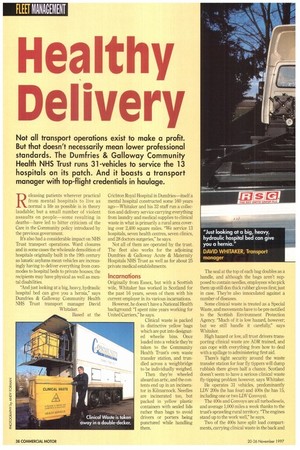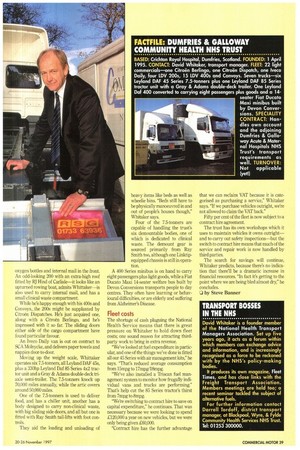HE MANAGEMENT
Page 40

Page 41

If you've noticed an error in this article please click here to report it so we can fix it.
Not all transport operations exist to make a profit. But that doesn't necessarily mean lower professional standards. The Dumfries & Galloway Community Health NHS Trust runs 31-vehicles to service the 13 hospitals on its patch. And it boasts a transport manager with top-flight credentials in haulage.
Releasing patients wherever practical from mental hospitals to live as normal a life as possible is in theory laudable; but a small number of violent assaults on people—some resulting in
deaths have led to bitter criticism of the Care in the Community policy introduced by the previous government.
It's also had a considerable impact on NHS Trust transport operations. Ward closures and in some cases the wholesale demolition of hospitals originally built in the 19th century as lunatic asylums mean vehicles are increasingly having to deliver everything from commodes to hospital beds to private houses; the recipients may have physical as well as mental disabilities.
"And just looking at a big, heavy, hydraulic hospital bed can give you a hernia," says Dumfries & Galloway Community Health NHS Trust transport manager David Whitaker.
Based at the Crichton Royal Hospital in Dumfries—itself a mental hospital constructed some 160 years ago—Whitaker and his 32 staff run a collection and delivery service carrying everything from laundry and medical supplies to clinical waste in what is primarily a rural area covering over 2,400 square miles. "We service 13 hospitals, seven health centres, seven clinics, and 28 doctors surgeries," he says.
Not all of them are operated by the trust. The fleet also works for the adjoining Dumfries & Galloway Acute & Maternity Hospitals NHS Trust as well as for about 25 private medical establishments.
Incarnations
Originally from Essex, but with a Scottish wife, Whitaker has worked in Scotland for the past 16 years, seven of them with his current employer in its various incarnations.
However, he doesn't have a National Health background: "I spent nine years working for United Carriers," he says.
Clinical waste is packed in distinctive yellow bags which are put into designated wheelie bins. Once loaded into a vehicle they're taken to the Community Health Trust's own waste transfer station, and trundled across a weighbridge to be individually weighed.
Then they're wheeled aboard an artic, and the contents end up in an incinerator in Kilmarnock. Needles are incinerated too, but packed in yellow plastic containers with sealed lids rather than bags to avoid drivers or porters being punctured while handling them. The seal at the top of each bag doubles as a handle, and although the bags aren't supposed to contain needles, employees who pick them up still don thick rubber gloves first; just in case. They're also innoculated against a number of diseases.
Some clinical waste is treated as a Special Waste, and movements have to be pre-notified to the Scottish Environment Protection Agency. "Much of it is low harard, however; but we still handle it carefully," says Whitaker.
High hazard or low, all trust drivers transporting clinical waste are ADR trained, and can cope with everything from how to deal with a spillage to administering first aid.
There's tight security around the waste transfer station for fear fly tippers will dump rubbish there given half a chance. Scotland doesn't seem to have a serious clinical waste fly-tipping problem however, says Whitaker.
He operates 31 vehicles, predominantly LDV 200s (he has four) and 400s (he has 15, including one or two LDV Convoys).
The 400s and Convoys are all turbodiesels, and average 1,000 miles a week thanks to the trust's sprawling rural territory: "The engines stand up to the work well," he says.
Two of the 400s have split load compartments, carrying clinical waste in the hack and
oxygen bottles and internal mail in the front. An odd-looking 200 with an extra-high roof fitted by Rj Hind of Carlisle—it looks like an upturned rowing boat, admits Whittaker—is also used to carry internal mail, and has a small clinical waste compartment.
While he's happy enough with his 400s and Convoys,, the 200s might be supplanted by Citroen Dispatches. He's just acquired one, along with a Citroen Berlingo, and he's impressed with it so far. The sliding doors either side of the cargo compartment have found particular favour.
An lveco Daily van is out on contract to SCA Molnycke, and delivers paper towels and nappies door-to-door.
Moving up the weight scale, Whittaker operates six 7.5-tanners, all Leyland DAF 45s, plus a 330hp Leyland Daf 85 Series 4x2 tractor unit and a Gray & Adams double-deck triaxle semi-trailer. The 7.5-tanners knock up 70,000 miles annually, while the artic covers around 50,000 miles.
One of the 7.5-tormers is used to deliver food, and has a chiller unit, another has a body designed to carry non-clinical waste, with big sliding side doors, and all but one is fitted with Ray Smith tail-lifts with foot controls.
They aid the loading and unloading of heavy items like beds as well as wheelie bins. "Beds still have to be physically manoeuvred in and out of people's houses though," Whitaker says.
Four of the 7.5-tonners are capable of handling the trust's six demountable bodies, one of which is dedicated to clinical waste. The demount gear is sourced primarily from Ray Smith too, although one Linktipequipped chassis is still in operation.
A 400 Series minibus is on hand to carry eight passengers plus light goods, while a Fiat Ducat° Maxi 14-seater welfare bus built by Devon Conversions transports people to day centres. They often have learning or behavioural difficulties, or are elderly and suffering from Alzheimer's Disease.
Fleet costs
The shortage of cash plaguing the National Health Service means that there is great pressure on Whitaker to hold down fleet costs; one sound reason for attracting thirdparty work to bring in extra revenue.
"We've looked at fuel expenditure in particular, and one of the things we've done is fitted all our 45 Series with air management kits," he says. "That's reduced average consumption from 15mpg to 17mpg/18mpg "We've also installed a Triscan fuel management system to monitor how frugally individual vans and trucks are performing." That's help cut the 85 Series tractor's thirst from 7mpg to 8rripg.
"We're switching to contract hire to save on capital expenditure," he continues. That was necessary because we were looking to spend £120,000 a year on new vehicles, but we were only being given £60,000.
"Contract hire has the further advantage that we can reclaim VAT because it is categorised as purchasing a service," Whitaker says. "If we purchase vehicles outright, we're not allowed to claim the VAT back."
Fifty per cent of the fleet is now subject to a contract hire agreement.
The trust has its own workshops which it uses to maintain vehicles it owns outright— and to carry out safety inspections—but the switch to contract hire means that much of the service and repair work is now handled by third parties.
The search for savings will continue, Whitaker predicts, because there's no indication that there'll be a dramatic increase in financial resources. "In fact it's getting to the point where we are being bled almost dry," he concludes.
ID by Steve Banner
TRANSPORT BOSSES IN THE NHS
David Whitaker is a founder member of the National Health Transport Managers Association, Set up five years ago, it acts as a forum within which members can exchange advice and information, and is increasingly recognised as a force to be reckoned with by the NHS's policy-making bodies.
It produces its own magazine, Fleet Times, and has close links with the Freight Transport Association. Members meetings are held too; a recent seminar tackled the subject of alternative fuels.
For further information contact Darrell Tordoff, district transport manager, at Blackpool, Wyre, & Fylcle Community Health Services NHS Trust. Tel: 01253 300000. FACTFILE: DUMFRIES & GALLOWAY COMMUNITY HEALTH NHS TRUST BASED: Crichton Royal Hospital, Dumfries, Scotland. FOUNDED: 1 April 1995. CONTACT: David Whitaker, transport manager. FLEET: 22 light commercials—one Citroen Berlingo, one Citroen Dispatch, one Iveco Daily, four LDV 200s, 15 LDV 400s and Convoys. Seven trucks—six Leyland DAF 45 Series 7.5-tonners plus one Leyland DAF 85 Series tractor unit with a Gray & Adams double-deck trailer. One Leyland Daf 400 converted to carrying eight passengers plus goods and a 14seater Fiat Ducat° Maxi minibus built by Devon Conversions. SPECIALITY CONTRACT: Handles own account and the adjoining Dumfries & Galloway Acute & Maternal Hospitals NHS Trust's transport requirements as well. TURNOVER:
Not applicable (yet!)
















































































































